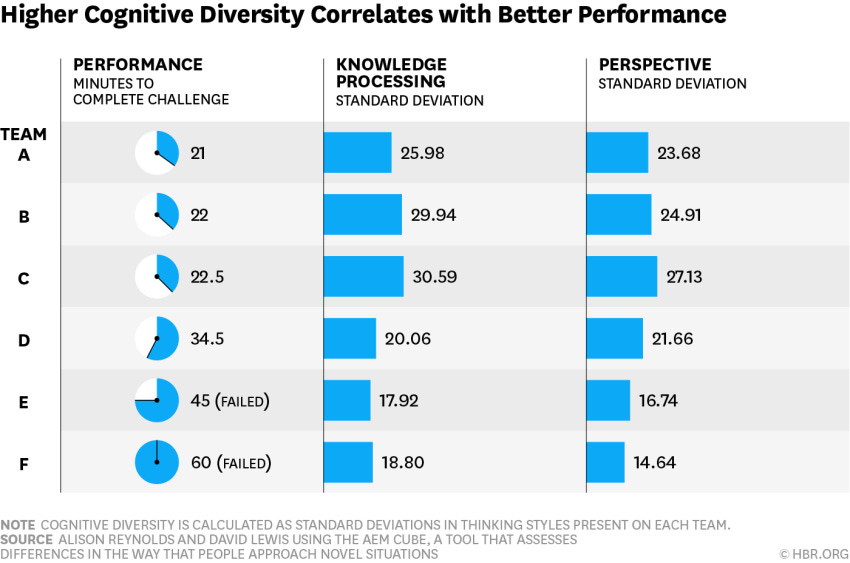A More Or Less Decent Public Life
Bruno Latour | Political Affiliation Bias | Independent Contractors | Cognitive Diversity Wins

Quote of the Moment
Facts remain robust only when they are supported by a common culture, by institutions that can be trusted, by a more or less decent public life, by more or less reliable media.
| Bruno Latour, the philosopher, who died this week at 75. This sentiment reminds me of Hilary Mantel’s line:
Evidence is always partial. Facts are not truth, though they are part of it – information is not knowledge. And history is not the past – it is the method we have evolved of organising our ignorance of the past.
Political Affiliation Bias
In Political Affiliation Bias Strains Some Workplaces, Allen Smith looks into the results of a recent Society for Human Resource Management (SHRM) Politics at Work Study.
The percentage of U.S. workers who say they've experienced political affiliation bias has risen 12 percentage points in the past three years.
Almost a quarter of the 504 workers surveyed in late August (24 percent) say they have personally experienced differential treatment, either positive or negative, because of their political views, compared with 12 percent of U.S workers in 2019.
[…]
Nearly half of U.S. workers (45 percent) have experienced political disagreements in the workplace. Companies can lean on their diversity, equity and inclusion strategies to help manage these conflicts.
"Differences in political viewpoint is indeed a diversity issue," said Jonathan Segal, an attorney with Duane Morris in Philadelphia and New York City. "It is but one example of diversity in thought. It is neither possible nor desirable to attempt to prohibit any political workplace discussions. An attempt by management to do so may align those who disagree on almost every political issue to agree on one thing: The employer is overreaching."
Twenty-six percent of U.S. workers engage in political discussions with their colleagues. Those who work fully in person are more likely to engage in political discussions with their co-workers (30 percent) than hybrid workers (24 percent) and fully remote workers (19 percent).
I recall the brouhaha that arose in 2021 when Basecamp attempted to end political discussions on the company’s internal chat tools:
Basecamp CEO issues apology after 'no political discussions at work' edict blows up in his face | Matthew Hughes
Jason Fried, CEO of project management tool Basecamp, has issued a public apology following a major bust-up over new policies that discouraged employees from discussing "societal politics" at work.
Writing on the company's blog, Fried said: "Last week was terrible. We started with policy changes that felt simple, reasonable, and principled, and it blew things up culturally in ways we never anticipated. David [Heinemeier Hansson, CTO] and I completely own the consequences, and we're sorry. We have a lot to learn and reflect on, and we will."
The furore began on 26 April, when Fried published a list of changes to working conditions at Basecamp.
Most were innocuous. The company would end the practice of peer performance reviews, ditch "paternalistic" benefits (like a fitness allowance or a farmer's market share) for a profit-sharing plan, and stop using committees to make strategic decisions.
More controversially, Fried said the company would ban discussions of political and societal issues on the work Basecamp account.
Over 30% of Basecamp employees reportedly left the company.
Allen Smith, again:
Only 8 percent of organizations have communicated guidelines to employees around political discussions at work leading up to the 2022 midterm elections, according to a separate survey of 1,525 HR professionals, conducted from Aug. 25 to Sept. 11.
Obviously, telling employees not to talk politics could lead to a real mess, but managers may not know how to deal with political rancor, and might actively promote political affiliation bias, as suggested by the SMHR study. And it might be illegal to quell such discussion, since it could be protected speech under ‘protected speech’ rules of the National Labor Relations Board.
Independent Contractors
In DOL Issues Proposed Rule on Independent Contractors, Leah Shepherd reports on a shift in the federal governments treatment of who is or isn’t an independent contractor, as with gig economy workers:
The DOL is proposing to rescind a 2021 rule in which two core factors—control over the work and opportunity for profit or loss—carried greater weight in determining the status of independent contractors. Under the new proposed rule, employers would use a totality-of-the-circumstances analysis, in which all the factors do not have a predetermined weight.
I’ve looked at the suggested rule change and it seems awfully vague and likely to spark all sorts of legal backlash. I will search for more clarity and return to this in upcoming issues.
Invisible Cognitive Diversity Beats Visible Diversity
The researchers Alison Reynolds and David Lewis had run a strategic execution exercise with over 100 groups and discerned no measurable impact on performance based on age, gender, or ethnic diversity of the groups. However, there was wide variability across different groups. What accounts for it?
We wanted to understand what led some groups to succeed and others to crash and burn. This led us to consider differences that go beyond gender, ethnicity, or age. We began to look more closely at cognitive diversity.
Cognitive diversity has been defined as differences in perspective or information processing styles. It is not predicted by factors such as gender, ethnicity, or age. Here we are interested in a specific aspect of cognitive diversity: how individuals think about and engage with new, uncertain, and complex situations.
The AEM Cube ‘assesses the way people approach change’, measuring knowledge processing (the extent individuals use existing knowledge, or to create new knowledge in novel situations?) and perspective (do individuals prefer their own experience, or to apply the ideas and expertise of others?).
Keep reading with a 7-day free trial
Subscribe to Work Futures to keep reading this post and get 7 days of free access to the full post archives.








